if条件状语从句及其时态的用法
- 格式:ppt
- 大小:277.50 KB
- 文档页数:11
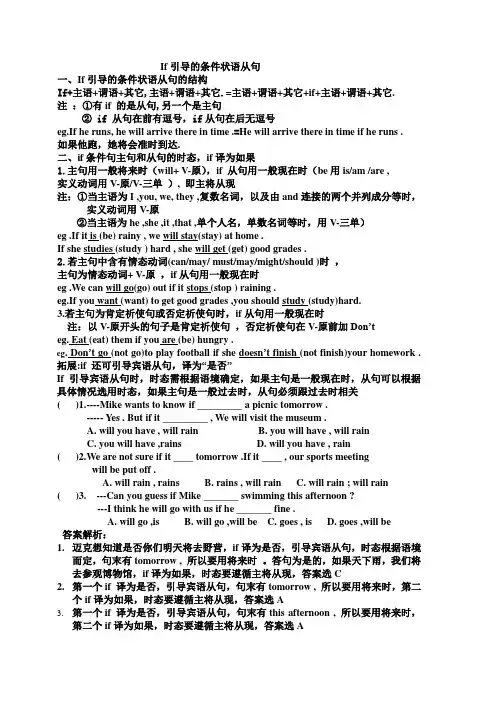
If引导的条件状语从句一、If引导的条件状语从句的结构If+主语+谓语+其它,主语+谓语+其它.=主语+谓语+其它+if+主语+谓语+其它.注:①有if 的是从句,另一个是主句② if 从句在前有逗号,if从句在后无逗号eg.If he runs, he will arrive there in time .=He will arrive there in time if he runs .如果他跑,她将会准时到达.二、if条件句主句和从句的时态,if译为如果1.主句用一般将来时(will+ V-原),if 从句用一般现在时(be用is/am /are ,实义动词用V-原/V-三单), 即主将从现注:①当主语为I ,you, we, they ,复数名词,以及由and连接的两个并列成分等时,实义动词用V-原②当主语为he ,she ,it ,that ,单个人名,单数名词等时,用V-三单)eg .If it is (be) rainy , we will stay(stay) at home .If she studies (study ) hard , she will get (get) good grades .2.若主句中含有情态动词(can/may/ must/may/might/should )时,主句为情态动词+ V-原,if从句用一般现在时eg .We can will go(go) out if it stops (stop ) raining .eg.If you want (want) to get good grades ,you should study (study)hard.3.若主句为肯定祈使句或否定祈使句时,if从句用一般现在时注:以V-原开头的句子是肯定祈使句,否定祈使句在V-原前加Don’teg. Eat (eat) them if you are (be) hungry .eg. Don’t go (not go)to play football if she doesn’t finish (not finish)your homework .拓展:if 还可引导宾语从句,译为“是否”If 引导宾语从句时,时态需根据语境确定,如果主句是一般现在时,从句可以根据具体情况选用时态,如果主句是一般过去时,从句必须跟过去时相关( )1.----Mike wants to know if _________ a picnic tomorrow .----- Yes . But if it _________ , We will visit the museum .A. will you have , will rainB. you will have , will rainC. you will have ,rainsD. will you have , rain( )2.We are not sure if it ____ tomorrow .If it ____ , our sports meeting will be put off .A. will rain , rainsB. rains , will rainC. will rain ; will rain ( )3. ---Can you guess if Mike _______ swimming this afternoon ?---I think he will go with us if he _______ fine .A. will go ,isB. will go ,will beC. goes , isD. goes ,will be答案解析:1.迈克想知道是否你们明天将去野营,if译为是否,引导宾语从句,时态根据语境而定,句末有tomorrow , 所以要用将来时。
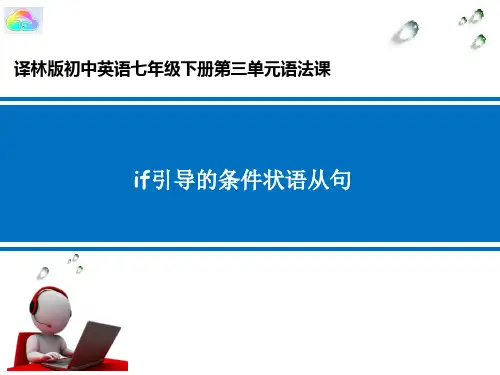
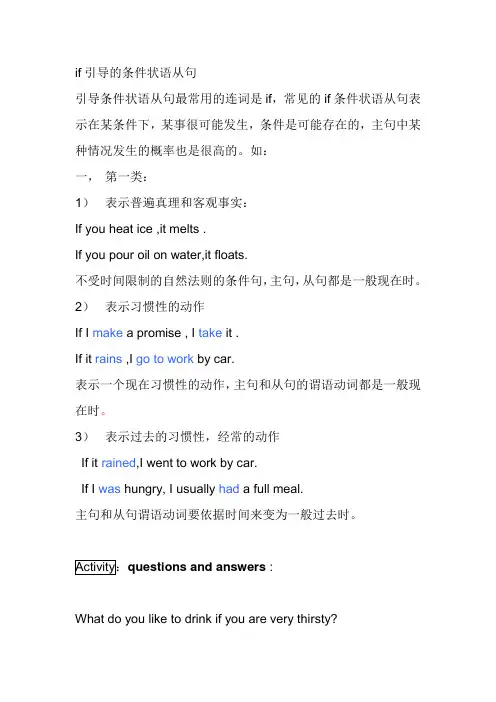
if引导的条件状语从句引导条件状语从句最常用的连词是if,常见的if条件状语从句表示在某条件下,某事很可能发生,条件是可能存在的,主句中某种情况发生的概率也是很高的。
如:一,第一类:1)表示普遍真理和客观事实:If you heat ice ,it melts .If you pour oil on water,it floats.不受时间限制的自然法则的条件句,主句,从句都是一般现在时。
2)表示习惯性的动作If I make a promise , I take it .If it rains ,I go to work by car.表示一个现在习惯性的动作,主句和从句的谓语动词都是一般现在时。
3)表示过去的习惯性,经常的动作If it rained,I went to work by car.If I was hungry, I usually had a full meal.主句和从句谓语动词要依据时间来变为一般过去时。
questions and answers :What do you like to drink if you are very thirsty?How many days are there in February it it is a leap year ? Who do people go and see if they get ill ?第二类:If we catch the 10 o’clock train ,we shall (will ,can,may,must ,should ) get there in time .If it is fine tomorrow ,we can have a picnic somewhere.If you wake up before me , give me a call .条件句(从句)用一般现在表示将来,主句用shall 加动词原型或者是祈使句在if 引导的条件状语从句中,如果从句谈论的是一个有可能发生的事实及其产生的相关的结果,主句用一般将来时态,从句用一般现在时态。
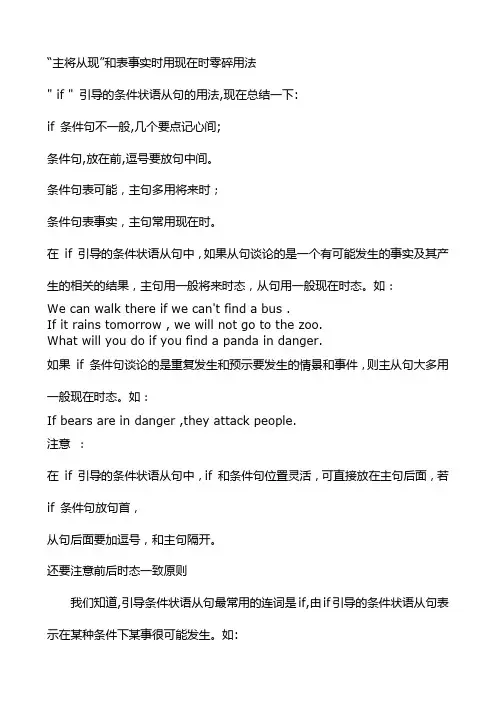
“主将从现”和表事实时用现在时零碎用法" if " 引导的条件状语从句的用法,现在总结一下:if 条件句不一般,几个要点记心间;条件句,放在前,逗号要放句中间。
条件句表可能,主句多用将来时;条件句表事实,主句常用现在时。
在if 引导的条件状语从句中,如果从句谈论的是一个有可能发生的事实及其产生的相关的结果,主句用一般将来时态,从句用一般现在时态。
如:We can walk there if we can't find a bus .If it rains tomorrow , we will not go to the zoo.What will you do if you find a panda in danger.如果if 条件句谈论的是重复发生和预示要发生的情景和事件,则主从句大多用一般现在时态。
如:If bears are in danger ,they attack people.注意:在if 引导的条件状语从句中,if 和条件句位置灵活,可直接放在主句后面,若if 条件句放句首,从句后面要加逗号,和主句隔开。
还要注意前后时态一致原则我们知道,引导条件状语从句最常用的连词是if,由if引导的条件状语从句表示在某种条件下某事很可能发生。
如:If you ask him, he will help you.如果你请他帮忙,他会帮你的。
If you fail in the exam, you will let him down.如果你考试不及格,你会让他失望的。
另外,if从句还表示不可实现的条件或根本不可能存在的条件,也就是一种虚拟的条件或假设,从句多用一般过去时或过去完成时。
如:If I were you, I would invite him to the party.如果我是你,我会邀请他参加聚会。
I would have arrived much earlier if I had not been caught in the traffic.如果没有堵车,我会到的早一点儿。
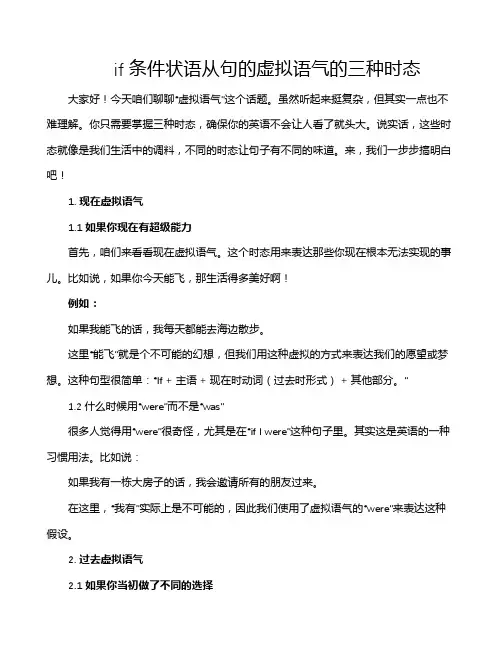
if条件状语从句的虚拟语气的三种时态大家好!今天咱们聊聊“虚拟语气”这个话题。
虽然听起来挺复杂,但其实一点也不难理解。
你只需要掌握三种时态,确保你的英语不会让人看了就头大。
说实话,这些时态就像是我们生活中的调料,不同的时态让句子有不同的味道。
来,我们一步步搞明白吧!1. 现在虚拟语气1.1 如果你现在有超级能力首先,咱们来看看现在虚拟语气。
这个时态用来表达那些你现在根本无法实现的事儿。
比如说,如果你今天能飞,那生活得多美好啊!例如:如果我能飞的话,我每天都能去海边散步。
这里“能飞”就是个不可能的幻想,但我们用这种虚拟的方式来表达我们的愿望或梦想。
这种句型很简单:“If + 主语 + 现在时动词(过去时形式) + 其他部分。
”1.2 什么时候用“were”而不是“was”很多人觉得用“were”很奇怪,尤其是在“if I were”这种句子里。
其实这是英语的一种习惯用法。
比如说:如果我有一栋大房子的话,我会邀请所有的朋友过来。
在这里,“我有”实际上是不可能的,因此我们使用了虚拟语气的“were”来表达这种假设。
2. 过去虚拟语气2.1 如果你当初做了不同的选择接下来是过去虚拟语气,这种时态用来讨论那些已经发生的事情,但我们想要改变它们的结果。
比如说,假如你当初选择了另外一条路,那事情可能就大相径庭了。
例如:如果我当初学了英语,现在可能会在国外工作。
这个句型的结构是:“If + 主语 + had + 过去分词 + 其他部分。
” 这表示你对过去的一个假设,比如说,你对某件事后悔了,想象如果当初做出不同的决定会怎样。
2.2 总是喜欢错过“早起的鸟儿”再举个例子:假如你去年没错过那些早起的机会,你现在可能会更成功。
这里我们可以这样说:如果我去年早起去跑步,现在身体就会更健康。
这就是过去虚拟语气的典型应用。
它帮助我们对已经发生的事情进行“如果……就……”的幻想。
3. 将来虚拟语气3.1 如果你能预见未来将来虚拟语气用来讨论未来的事情,但这些事情通常是非常不确定或者不可能发生的。
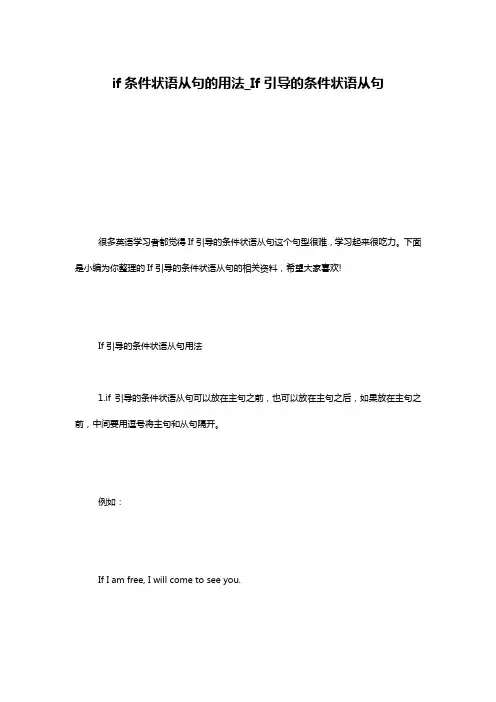
if条件状语从句的用法_If引导的条件状语从句很多英语学习者都觉得If引导的条件状语从句这个句型很难,学习起来很吃力。
下面是小编为你整理的If引导的条件状语从句的相关资料,希望大家喜欢!If引导的条件状语从句用法1.if引导的条件状语从句可以放在主句之前,也可以放在主句之后,如果放在主句之前,中间要用逗号将主句和从句隔开。
例如:If I am free, I will come to see you.= I will come to see you if I am free.如果我有空,我就来看你。
2. 在含if引导的条件状语从句的复合句中,主句用一般将来时,从句通常用一般现在时态表示将来意义,即主将从现原则。
例如:If it snows tomorrow, we will go skiing.如果明天下雪,我们就去滑雪。
3. 在含if引导的条件状语从句的复合句中,语句的谓语还可含有情态动词can、must、may等,主句也可是祈使句。
例如:If it stops raining, we can go out.如果雨停了,我们就能出去。
4. 在含if引导的条件状语从句的复合句中,如果主句部分描述的是客观事实或真理,要用一般现在时。
例如:If you heat the ice, it turns into water.如果你加热冰,它就会变成水。
if引导的非真实条件句对过去的虚拟条件从句(if):主语+had done 主句might/would/should/could+have done 对现在的虚拟if+ 主语+动词过去式(be用were)主句might/would/should/could+do对将来的虚拟if+主语+动词过去式(be用were)或主语+should do或主语+were to do主句might/would/should/could+doe.g.Tom got to the station in time because he started earlier.If Tom had started late, he would have missed the train.Do you think the thief entered through the door?No, if he had, I don't believe, he would have broken the living room window.If the book weren't so expensive, I would buy it.If you didn't live so far away, we would be able to visit you more.What would you do if you lost your passport in a foreign country?Why hasn't he come? If he should not come on time, we would have to put off the trip.2.注意事项e.g.If she hadn't work hard at English in the past, she wouldn't work as well as a secretary in a large company now. 混合时间的虚拟语气从句为对过去的虚拟,主句是现在。
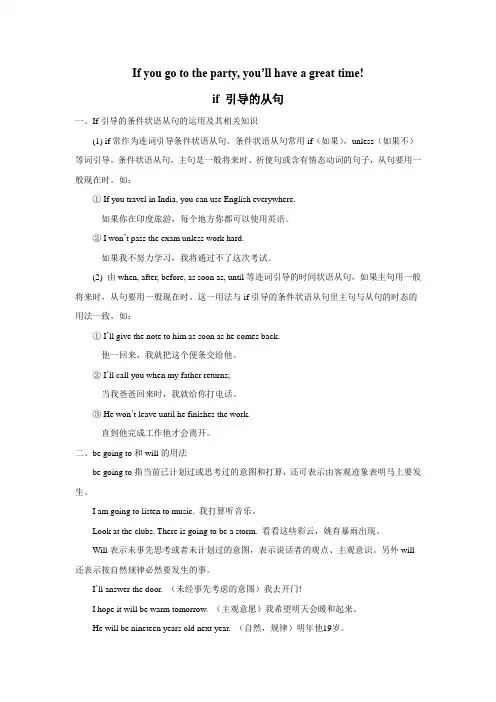
If you go to the party, you’ll have a great time!if 引导的从句一、If引导的条件状语从句的运用及其相关知识(1) if常作为连词引导条件状语从句。
条件状语从句常用if(如果),unless(如果不)等词引导。
条件状语从句,主句是一般将来时、祈使句或含有情态动词的句子,从句要用一般现在时。
如:① If you travel in India, you can use English everywhere.如果你在印度旅游,每个地方你都可以使用英语。
② I won’t pass the exam unless work hard.如果我不努力学习,我将通过不了这次考试。
(2) 由when, after, before, as soon as, until等连词引导的时间状语从句,如果主句用一般将来时,从句要用一般现在时。
这一用法与if引导的条件状语从句里主句与从句的时态的用法一致。
如:① I’ll give the note to him as soon as he comes back.他一回来,我就把这个便条交给他。
② I’ll call you when my father returns;当我爸爸回来时,我就给你打电话。
③ He won’t leave until he finishes the work.直到他完成工作他才会离开。
二、be going to和will的用法be going to指当前已计划过或思考过的意图和打算,还可表示由客观迹象表明马上要发生。
I am going to listen to music. 我打算听音乐。
Look at the clubs. There is going to be a storm. 看看这些彩云,姚有暴雨出现。
Will表示未事先思考或者未计划过的意图,表示说话者的观点、主观意识。
另外will 还表示按自然规律必然要发生的事。
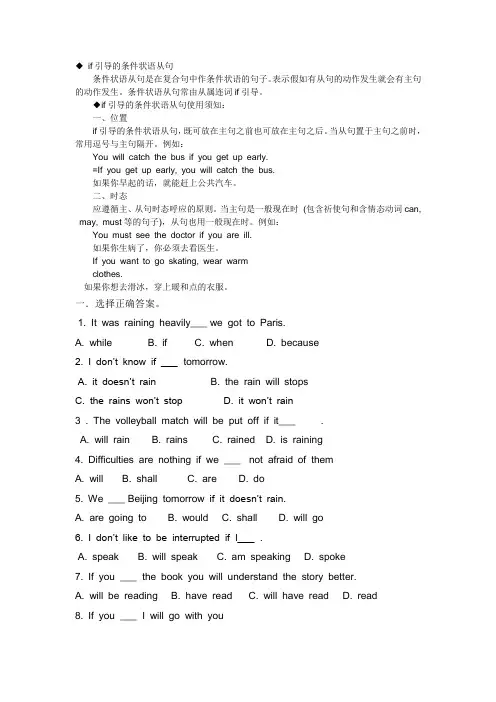
◆if引导的条件状语从句条件状语从句是在复合句中作条件状语的句子。
表示假如有从句的动作发生就会有主句的动作发生。
条件状语从句常由从属连词if引导。
◆if引导的条件状语从句使用须知:一、位置if引导的条件状语从句,既可放在主句之前也可放在主句之后。
当从句置于主句之前时,常用逗号与主句隔开。
例如:You will catch the bus if you get up early.=If you get up early, you will catch the bus.如果你早起的话,就能赶上公共汽车。
二、时态应遵循主、从句时态呼应的原则。
当主句是一般现在时(包含祈使句和含情态动词can, may, must等的句子),从句也用一般现在时。
例如:You must see the doctor if you are ill.如果你生病了,你必须去看医生。
If you want to go skating, wear warmclothes.如果你想去滑冰,穿上暖和点的衣服。
一.选择正确答案。
1. It was raining heavily___ we got to Paris.A. whileB. ifC. whenD. because2. I don’t know if ___ tomorrow.A. it doesn’t rainB. the rain will stopsC. the rains won’t stopD. it won’t rain3 . The volleyball match will be put off if it___ .A. will rainB. rainsC. rainedD. is raining4. Difficulties are nothing if we ___ not afraid of themA. willB. shallC. areD. do5. We ___ Beijing tomorrow if it doesn’t rain.A. are going toB. wouldC. shallD. will go6. I don’t like to be interrupted if I___ .A. speakB. will speakC. am speakingD. spoke7. If you ___ the book you will understand the story better.A. will be readingB. have readC. will have readD. read8. If you ___ I will go with youA. go toB. wentC. willD. should go9. I’ll go to meet you,if I ___ free then.A. would beB. will beC. amD. was10. If you ___ to the music, buy a CD.A. will listenB. listenC. listeningD. listened11. He suggested ___ a pinic tomorrow.A. to haveB. havingC. haveD. to having12. Be careful, if you ___ want to make mistakes.A. won’tB. don’tC. didn’tD. not13. Work hard if you ___ to get a good mark.A. wantedB. wantingC. wantD. will want14. I want to know if you___ to the party tomorrow.I will if I___ free.A. will come; amB. come; amC. will come; will beD. come; will be15. The cat ___ him___ the hand.A. bit; inB. bited; onC. bit; onD. bited; on16. There is going to ___ a sports meeting next week. If it ___ , we’ll have to cancel it..A. be; will rainB. have; will rainC. be; rainsD. give; is going to rain17. If he ___ , I ___ go swimming alone.A. doesn’t come will goB. won’t come; will goC. will come; won’t goD. is coming; don’t go18. If you ___ a chance to study in a foreign country, just take it.A. gettingB. had gotC. will getD. get19. Frank ___ a film if he’s free next Saturday.A. seeB. sawC. has seenD. will see20. If he ______ exercise, he ___ healthy.A. not; willB. isn’t; won’t beC. doesn’t; will beD. doesn’t do; won’t be21.I don't know if he___ tomorrow.If he ___ ,I'll tell you.A.will come;comes B.comes;comesC.comes;will D.is coming;is coming22.If you _____ to the party, you’ll have a great time.A. will goB. wentC. goD. going23. It will be a long time ____ Peter _____ his work. A. since, has finis hed B. after, finishes C. when, will finish D. before, finishes.24. What will father _____ us from Japan?A. takeB. bringC. carryD. make25. Weifang is famous ______ kites.A. forB. toC. onD. with26.I ____ her the answer if she ____me.A. can tell, will askB. will tell, will askC. would tell, askD. will tell, asks27. –What are you going to do tomorrow?--We’ll go to the library tomorrow if it ____.A. isn’t rainB. rainC. won’t rainD. doesn’t rain28.—Do you know when he will come back tomorrow?--Sorry, I don’t know. When he ____ back, I’ll tell you.A. comesB. will comeC. comeD. may come29. What will you do if you _____ to the old folk’s home visit?A. goB. wentC.goingD. will go30. If I eat ____ food, I’ll be very fat.A. too manyB. many tooC. too muchD. much too31. I’ll give the book to him if he ___ here next Sunday.A. will comeB. comesC. is comingD. came32. There ____an English film in our school tomorrow.A. is going to haveB. will haveC. is going to beD. has33. Could you tell us where ____?A. will the next Olympic Games heldB. the next Olympic Games will be heldC. would the next Olympic Games be heldD. the next Olympic Games would be held34. When my mother returned last night, I ____ a book.A. readB. am readingC. was readingD. am going to read35.What ____ you ____ when it began to rain?A. do, doB. were, doingC. are, doingD. did, do36. I’ll wake yo u up when he ____back.A. willB. is going to comeC. comesD. come二.在正确的答案下划一条线。
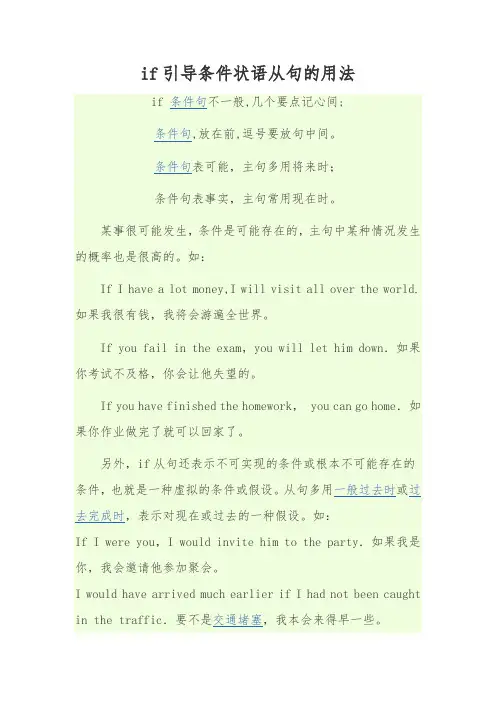
if引导条件状语从句的用法if 条件句不一般,几个要点记心间;条件句,放在前,逗号要放句中间。
条件句表可能,主句多用将来时;条件句表事实,主句常用现在时。
某事很可能发生,条件是可能存在的,主句中某种情况发生的概率也是很高的。
如:If I have a lot money,I will visit all over the world.如果我很有钱,我将会游遍全世界。
If you fail in the exam,you will let him down.如果你考试不及格,你会让他失望的。
If you have finished the homework,you can go home.如果你作业做完了就可以回家了。
另外,if从句还表示不可实现的条件或根本不可能存在的条件,也就是一种虚拟的条件或假设。
从句多用一般过去时或过去完成时,表示对现在或过去的一种假设。
如:If I were you,I would invite him to the party.如果我是你,我会邀请他参加聚会。
I would have arrived much earlier if I had not been caught inthe traffic.要不是交通堵塞,我本会来得早一些。
另外你还要注意if 条件句的时态搭配1.if从句用一般现在时,主句用一般将来时If he runs he’ll get there in time. 如果他用跑的,他就会及时赶到那儿。
The cat will scratch you if you pull her tail. 如果你拉猫的尾巴,它就会抓你。
2.if从句用一般现在时,主句用may/might/canIf the fog gets thicker the plane may/might be diverted. 如果雾在大一些,飞机可能就会改在别的机场降落。
If it stops snowing we can go out. 如果雪停了,我们就可以出去。
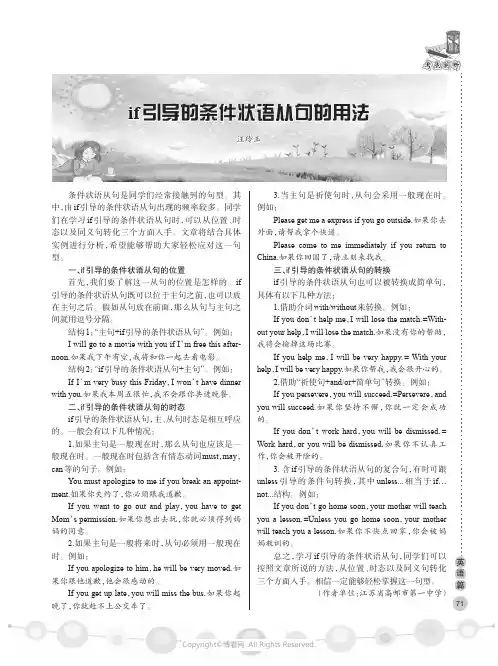
考点剖析条件状语从句是同学们经常接触到的句型。
其中,由if 引导的条件状语从句出现的频率较多。
同学们在学习if 引导的条件状语从句时,可以从位置、时态以及同义句转化三个方面入手。
文章将结合具体实例进行分析,希望能够帮助大家轻松应对这一句型。
一、if 引导的条件状语从句的位置首先,我们要了解这一从句的位置是怎样的。
if 引导的条件状语从句既可以位于主句之前,也可以放在主句之后。
假如从句放在前面,那么从句与主句之间就用逗号分隔。
结构1:“主句+if 引导的条件状语从句”。
例如:I will go to a movie with you if I ’m free this after-noon.如果我下午有空,我将和你一起去看电影。
结构2:“if 引导的条件状语从句+主句”。
例如:If I ’m very busy this Friday ,I won ’t have dinner with you.如果我本周五很忙,我不会跟你共进晚餐。
二、if 引导的条件状语从句的时态if 引导的条件状语从句,主、从句时态是相互呼应的。
一般会有以下几种情况:1.如果主句是一般现在时,那么从句也应该是一般现在时。
一般现在时包括含有情态动词must ,may ,can 等的句子。
例如:You must apologize to me if you break an appoint-ment.如果你失约了,你必须跟我道歉。
If you want to go out and play ,you have to get Mom ’s permission.如果你想出去玩,你就必须得到妈妈的同意。
2.如果主句是一般将来时,从句必须用一般现在时。
例如:If you apologize to him ,he will be very moved.如果你跟他道歉,他会很感动的。
If you get up late ,you will miss the bus.如果你起晚了,你就赶不上公交车了。
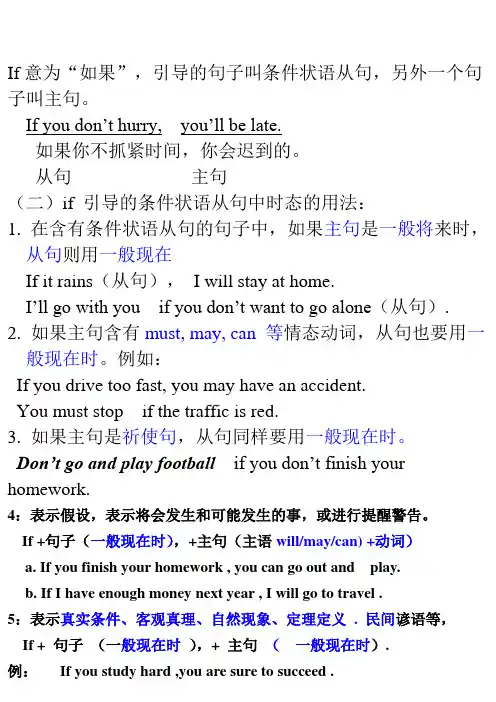
If意为“如果”,引导的句子叫条件状语从句,另外一个句子叫主句。
If you don’t hurry,you’ll be late.如果你不抓紧时间,你会迟到的。
从句主句(二)if 引导的条件状语从句中时态的用法:1. 在含有条件状语从句的句子中,如果主句是一般将来时,从句则用一般现在If it rains(从句),I will stay at home.I’ll go with you if you don’t want to go alone(从句).2. 如果主句含有must, may, can 等情态动词,从句也要用一般现在时。
例如:If you drive too fast, you may have an accident.You must stop if the traffic is red.3. 如果主句是祈使句,从句同样要用一般现在时。
Don’t go and play football if you don’t finish your homework.4:表示假设,表示将会发生和可能发生的事,或进行提醒警告。
If +句子(一般现在时),+主句(主语will/may/can) +动词)a. If you finish your homework , you can go out and play.b. If I have enough money next year , I will go to travel .5:表示真实条件、客观真理、自然现象、定理定义. 民间谚语等,If + 句子(一般现在时),+ 主句(一般现在时).例:If you study hard ,you are sure to succeed .If you put ice in a warm place ,it turns into water .If a glass falls on the floor, it usually breaksIf you cook a banana, it becomes very soft .If a plant don’t get enough light ,it grows very tall and thin.现在完成进行时/现在完成时They have built a new bridge.他们已建造了一座新桥。
if引导的条件状语从句
if意为“如果”,引导条件状语从句时,表示假如有从句的动作发生就(不)会有主句的动作发生。
常见的if条件状语从句表示在某条件下,某事很可能发生,条件是可能
存在的,主句中某种情况发生的概率也是很高的。
结构:if+一般现在时,主语+将来时
含义:如果……,将要……
例如:If you ask him, he will help you.
如果你请求他,他会帮助你。
If need be, we’ll work all night.
如果需要,我们就干个通宵。
if从句用一般现在时,主句用一般将来时。
if从句用一般现在时,主句用may/might/can?。
if从句用一般现在时,主句用must/should?。
if从句用一般现在时,主句用一般现在时。
if从句用现在进行时,主句用一般将来时。
if从句用现在完成时,主句用一般将来时。
由引导词if或unless引导的状语从句叫做条件状语从句。
在英文中,条件是指某一
件事情实现之后状语从句中的动作,其它事情主句中的动作才能发生,通常译作“假如”。
注意:在含有条件状语从句的复合句中,表示将来时态,主句是一般将来时态,祈使
句或情态动词,从句要用现在时态,[主将从现原则]主将从现,将并非指将来时,还指表
示将来含义的,跟着if后的那句话是从句。
感谢您的阅读,祝您生活愉快。
索罗学院
if 引导的条件状语从句的时态问题?
疑点:if 引导的条件状语从句的时态问题?
解析:在if 引导的条件状语从句中,主句应用将来时态,状语从句要用一般现在时态。
例句:You'll have a great time if you go to the party.如果你去这个聚会,你会过的很快乐。
(句中,you go to the party是if 引导的条件状语从句,是从句;You'll have a great time是主句。
主句You'll have a great time用的是将来时态,从句you go to the party用的是一般现在时态) 例句:If you go to the party, you'll have a great time. 如果你去这个聚会,你会过的很快乐。
(这个例句是由上个例句变换得来的。
句中,you go to the party是if 引导的条件状语从句,是从句;you'll have a great time是主句。
主句you'll have a great time用的是将来时态,从句you go to the party用的是一般现在时态)
注:学习条件状语从句的时态问题重点是区分从句和主句,从句可能在前面,也可能在后面。
总结起来说,if 后面的半个句子是从句,其他的部分是主句。
本文由索罗学院整理索罗学院是一个免费的中小学生学习网,上面有大量免费学习视频,欢迎大家前往观看!。
专项语法讲练——if条件状语从句及其时态的用法【概念引入】英国前首相撒切尔夫人(Margaret Thatcher)曾用if条件句对男人和女人进行评价:In politics, if you want someone to make a speech, ask a man; if you want something done, ask a woman.在政治领域,如果你想要有人发表演说,那就找男士去;而如果你想真正把事情解决,那就找女士。
【用法讲解】一、概念连词if的意思是“如果”,它引导的句子表示某事发生所需要的条件,即“在……条件下某事才能发生”,在句子中充当状语,因此我们称之为条件状语从句。
在复合句中连词if引导的句子为从句,被修饰的句子为主句。
从句可以放在主句后,也可以放在主句前,从句放在主句前时,应用逗号将它与主句隔开。
例如:We’ll go to the Great Wall if it doesn’t rain tomorrow. = If it doesn’t rain tomorrow, we’ll go to the Great Wall. 如果明天不下雨,我们就去长城。
二、用法1. 条件状语从句通常由连词if引导,意为“如果,假如”,主句不能用be going to 表示将来,而应该用shall或will。
例如:If I’m free tomorrow, I’ll go with you. 如果我明天有空,我将会和你一起去。
2. if引导的条件状语从句,主句用一般将来时,从句则用一般现在时,即“主将从现”。
例如:If it is sunny tomorrow, I’ll climb the hill. 如果明天天气晴朗,我将去爬山。
3. 正确区分if引导的条件状语从句和if引导的宾语从句。
在条件状语从句中,if表示“如果”;而在宾语从句中,if表示“是否”。
可以用下面的方法区分:1) 从句前置法:if引导的条件状语从句,可以放在主句之前并用逗号隔开,也可放在主句之后;而if引导的宾语从句只能放在主句之后。
if条件状语从句的虚拟语气的三种时态哎呀,你问这个问题可真是让我头疼啊!不过,既然你是我朋友,我也不能让你失望。
那我就来给你讲讲if条件状语从句的虚拟语气的三种时态吧!
我们来说说第一种时态:过去式。
这种时态用在假设我们已经知道的事情是不可能实现的情况下。
比如说,如果你问我:“如果我有超能力,我会飞吗?”我就可以回答:“哦,你以前不会飞啊?那你现在也不会飞了。
”这就是过去式的用法。
接下来,我们说说第二种时态:过去完成时。
这种时态用在假设我们已经完成的事情是不可能实现的情况下。
比如说,如果你问我:“如果我昨天赢了一百万彩票,我现在会有这么多钱吗?”我就可以回答:“哦,你昨天赢了一百万啊?那你现在肯定没有这么多钱了。
”这就是过去完成时的用法。
我们说说第三种时态:过去将来时。
这种时态用在假设我们将来会做的事情是不可能实现的情况下。
比如说,如果你问我:“如果我明天中了五百万大奖,我现在会有这么多钱吗?”我就可以回答:“哦,你明天中五百万啊?那你现在肯定没有这么多钱了。
”这就是过去将来时的用法。
好了,我知道你可能还是有点云里雾里的。
但是,只要你记住这三个时态的用法,以后遇到类似的问题就不会再犯愁了。
这只是if条件状语从句的虚拟语气的一小部分内容。
如果你还想了解更多关于英语语法的知识,欢迎随时来找我聊天哦!。